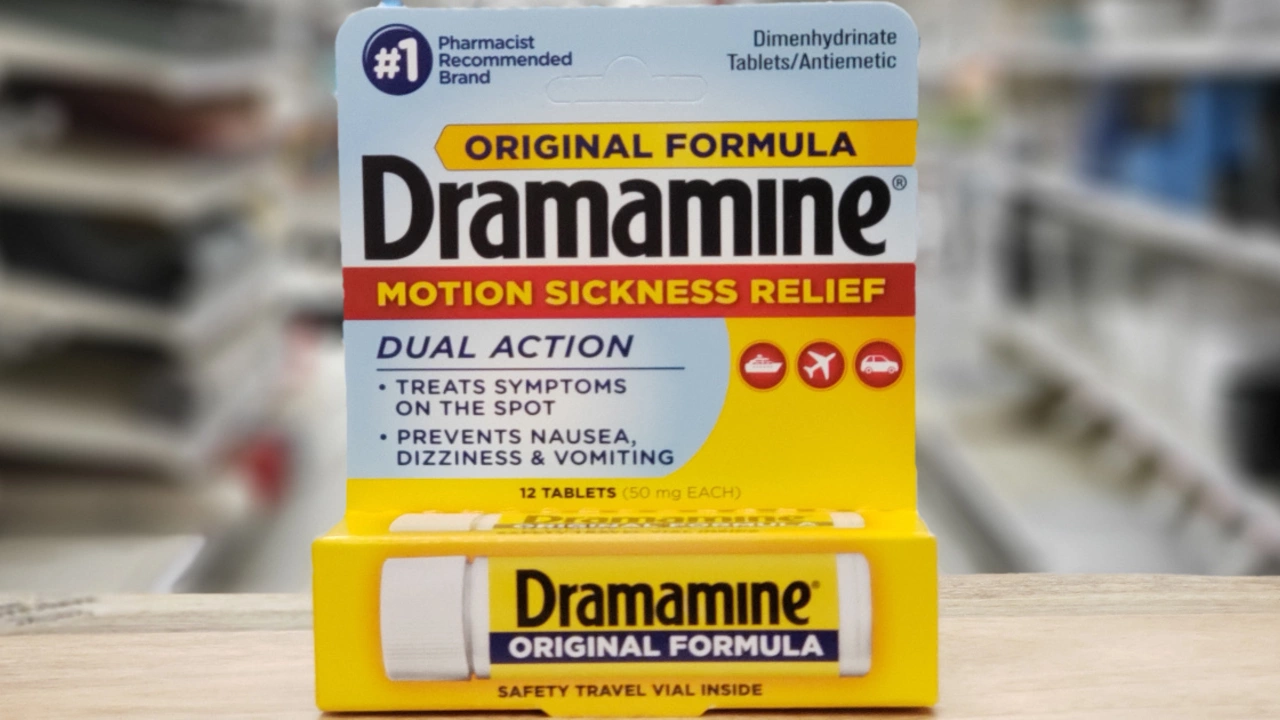Dimenhydrinate: Motion Sickness Relief, Dosing, Side Effects
Feeling queasy on cars, planes, or boats? Dimenhydrinate is an over-the-counter antihistamine many people use to prevent and treat motion sickness. It calms the inner ear signals that trigger nausea so you can travel with less worry.
How people use it
Take dimenhydrinate 30–60 minutes before travel for best effect. Adults typically take 50–100 mg, repeated every 4–6 hours as needed, with a common maximum of about 400 mg in 24 hours. For kids follow the product label or your pediatrician; many children's formulations use lower doses and different schedules. Always check the package and talk to your doctor if you have liver disease, glaucoma, an enlarged prostate, or a history of breathing problems.
What to expect and side effects
The most common side effect is drowsiness. You may also notice dry mouth, blurred vision, or mild confusion, especially at higher doses or in older adults. Because it can make you sleepy, avoid driving or operating heavy machinery until you know how it affects you. Mixing dimenhydrinate with alcohol, sedatives, or other antihistamines increases drowsiness and risk, so avoid combining them.
Interactions and cautions
Dimenhydrinate acts on histamine and acetylcholine receptors, so it can interact with MAO inhibitors and some antidepressants, blood pressure medicines, and anti-seizure drugs. Pregnant or breastfeeding people should check with their healthcare provider before using dimenhydrinate. If you have heart disease, high blood pressure, or thyroid problems, consult a clinician first.
Alternatives and non-drug options
If dimenhydrinate causes too much drowsiness or you prefer a different approach, try meclizine (often less sedating), a scopolamine patch for long trips, or natural options like ginger and acupressure wrist bands. Behavioral tricks help too: sit where motion is least felt (front seat, over the wing on a plane), look at the horizon, get fresh air, and avoid heavy meals before travel.
Buying and safe use
Buy dimenhydrinate from known pharmacies and check expiration dates. Read dosing instructions and keep it away from children. If symptoms persist despite treatment, or you experience severe side effects like fast heartbeat, high fever, severe confusion, or trouble breathing, seek medical help right away.
Want more?
On MyOTCStore.com you’ll find guides comparing motion sickness meds, tips to buy medicines online safely, and practical reviews to help you pick the right option for your trips. Use those resources to make smarter, safer choices before you travel.
Extra tips: don’t give dimenhydrinate to children under two unless a doctor says so. Start with the lowest effective dose and test it at home before a long trip. Store tablets in a cool, dry place away from direct sunlight. If you accidentally take more than the recommended dose, call poison control or seek emergency care—symptoms of overdose include extreme drowsiness, fast heartbeat, seizures, or difficulty breathing. For seniors, anticholinergic drugs like dimenhydrinate can increase fall risk and confusion; ask a clinician about gentler options. Keep a list of all your medicines and show it to any provider before adding dimenhydrinate.
Safe.

Dimenhydrinate for Morning Sickness: Safety and Effectiveness
- 19 Comments
- Jul, 12 2023
In my recent research, I delved into the effectiveness and safety of Dimenhydrinate for treating morning sickness. It's a popular choice, as it's been proven to successfully alleviate nausea and vomiting often experienced during pregnancy. However, like all medications, it's crucial to understand the potential side effects. Fortunately, studies suggest that it is generally safe for pregnant women, causing no significant increase in birth defects. Yet, it's always best to consult with a healthcare professional before starting any new medication.




